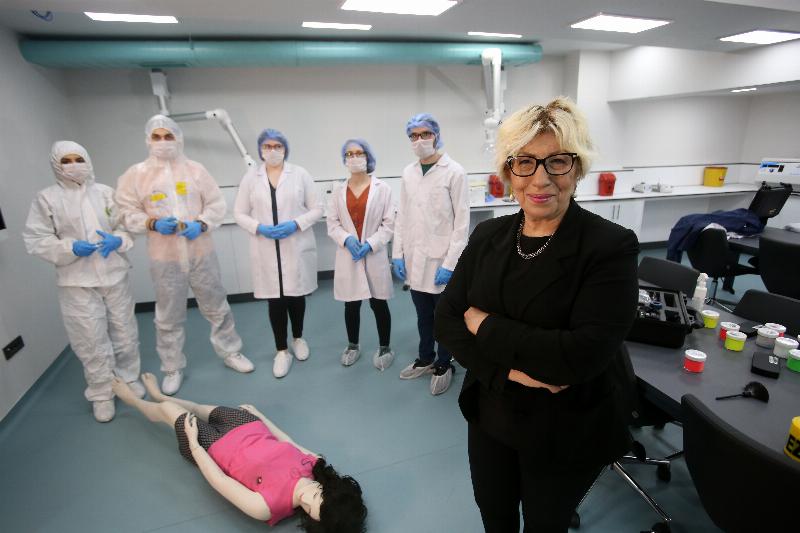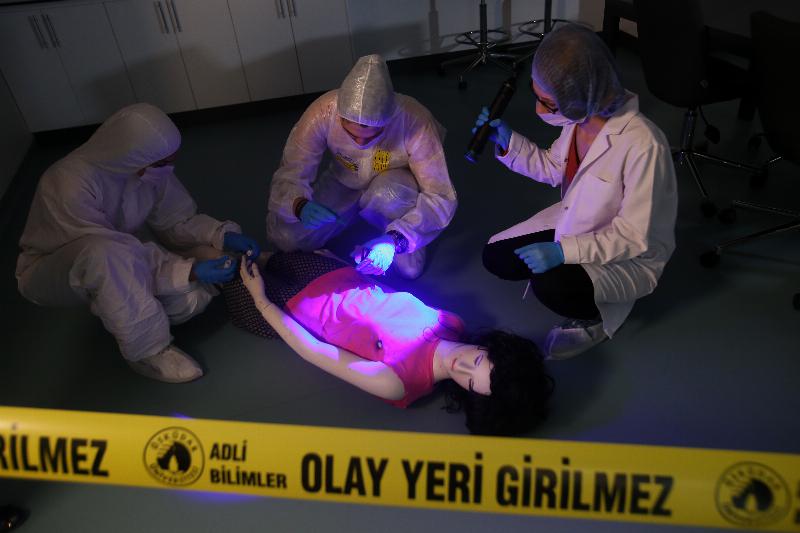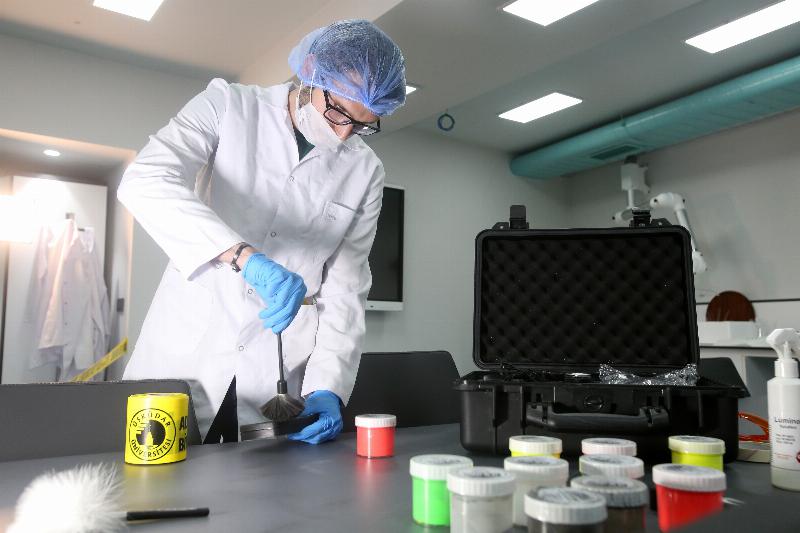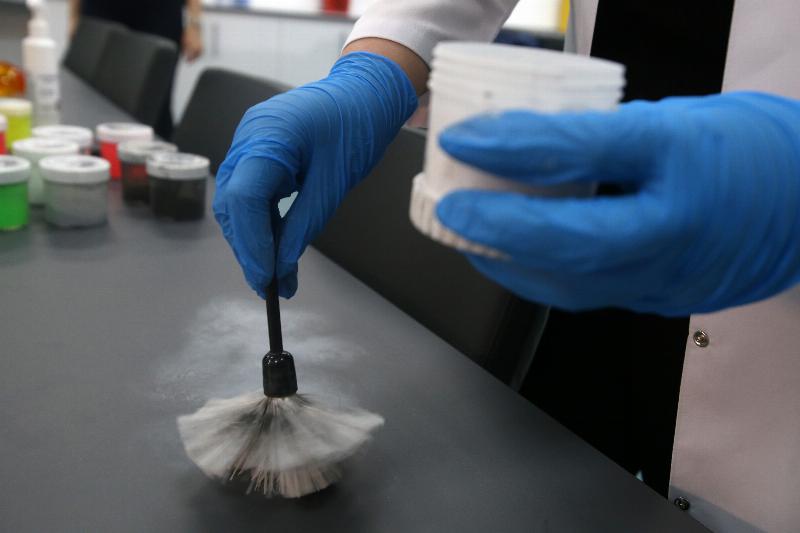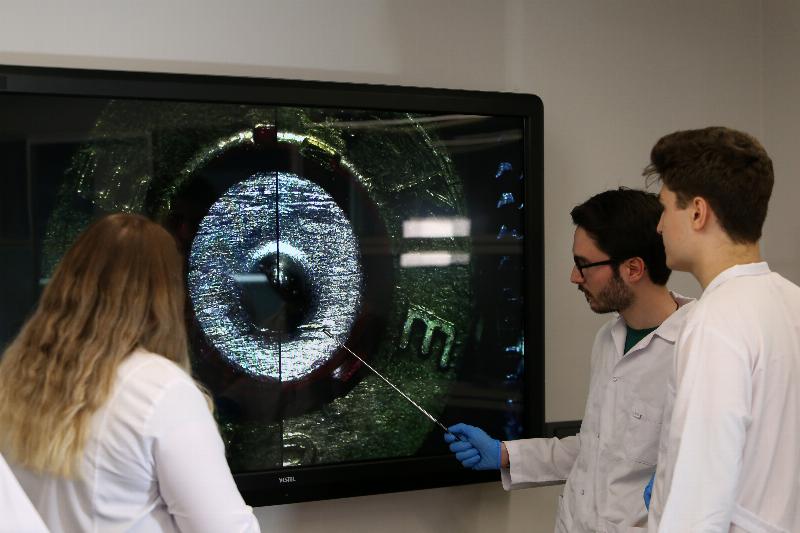It is Possible to Become a Forensic Science Expert with a Master's Degree
What is the Addiction, and Forensic Science Master's Program?
The Graduate School of Addiction, and Forensic Sciences aims to be the first in our country in terms of vision, and mission, focusing on crime prevention, and crime analysis as well as providing international quality graduate education, and training to graduates of almost every undergraduate branch with 9 different specialties. The Graduate School of Addiction, and Forensic Sciences, which was established on April 9, 2016, and aims to train qualified forensic science experts, deals with the prevention of violence against women, and children, and the prediction of crime.
Graduate School of Addiction, and Forensic Sciences
The following fields are taking place under the Department of Forensic Sciences of the Graduate School of Addiction, and Forensic Sciences:
- Forensic Chemistry,
- Forensic Pharmacology, and Toxicology,
- Forensic Biology,
Forensic Genetics, - Forensic Nursing / Midwifery,
- Crime Scene Investigation, and Criminalistics,
ICT Forensic Crimes, - Forensic Psychology,
- Crime Prevention, and Analysis
- ICT Forensic Crimes
What is ICT Forensic Crimes?
Forensic Informatics is a new science with a dedicated, and disciplined structure that sets principles, and standards for the collection, storage, compilation, and analysis of evidence obtained as data through information systems. Regarding an incident that has been referred to the court, the application of criminalistics principles to the information devices seized in the incident, with regard to the request to examine these devices.
Forensic Informatics covers many stages. Aims to obtain evidence from floppy disks, hard drives, and extractable disks, as well as to protect the integrity of the evidence, and expose material truth, taking into account the information, evidence review processes, legal, and ethical responsibilities that electronic evidence is present in. The entire process of copying, determining, analyzing, interpreting, and documenting is called forensic informatics. This data is located in active areas, erased areas or residual areas of media used to store information.
Forensic Informatics, under the main title of 'Information Security', it is possible to sort as a sub-science consisting of the science of law, and computer security. In the same way, this discipline can be considered as an approach involving forensic analysis, and studies against ICT crimes, information security vulnerability, national security measures, and computer abuses.
What are the courses learned in the Forensic Information Crimes Program?
In the field of Forensic Information Crimes, any information object consisting of audio, images, data, information, or combinations stored or transmitted by electromagnetic, and electro-optical environments is intended to be identified, obtained, stored, examined, and presented to the court in a way that is numerical evidence in the court. There are also studies linking data stored on multiple hard drives, and expanding the area of use to include social networks.
What are the Working Areas of Forensic Information Crime Experts?
Forensic Information Crimes Specialists can work as specialists in the relevant majors of Police Criminal, and Gendarmerie Criminal Laboratories, and forensic medicine institutions, and universities.
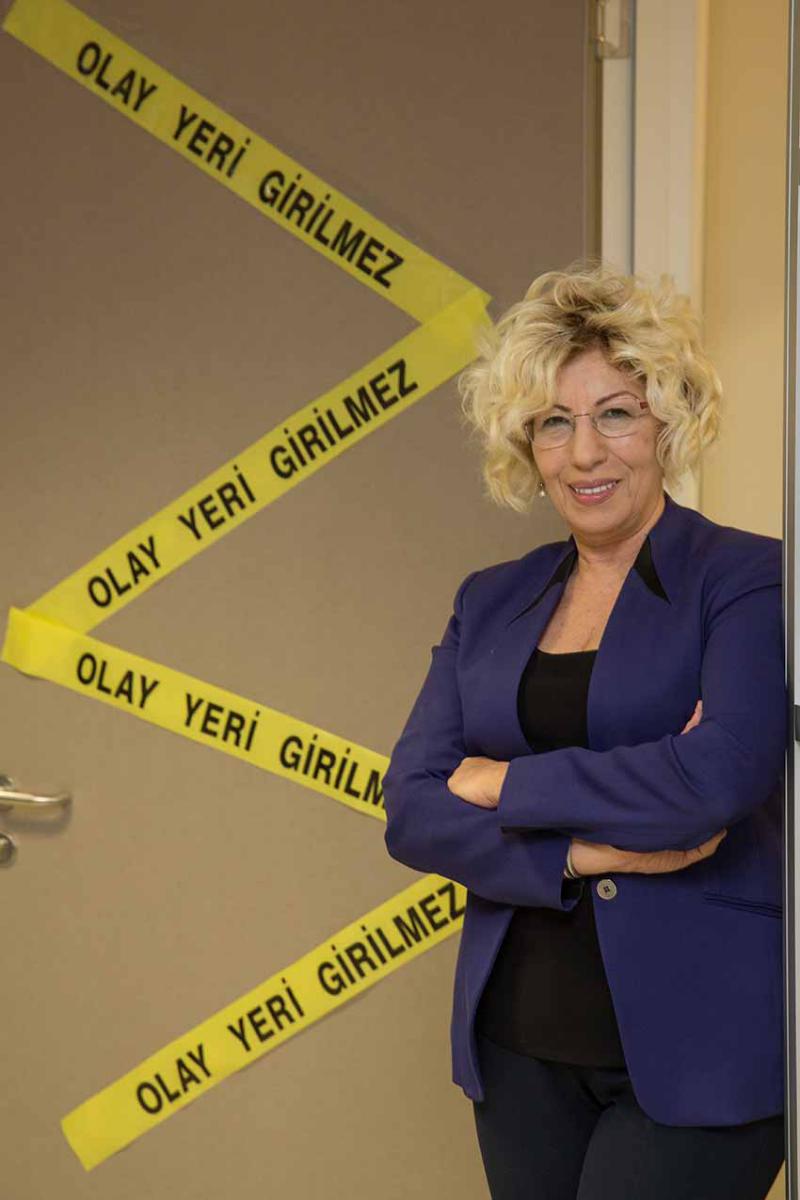 Forensic Biology
Forensic Biology
What is Forensic Biology?
Identification of biological samples collected from the scene in forensic science, and criminal investigations in the determination of fatherly-kinship relations is carried out by DNA analysis. Forensic Biology is the science in which these analyses are carried out. In these analyses, DNA should be examined directly at the molecular level.
What are the courses learned in the Forensic Biology program?
In the Forensic Biology Program, biological samples are taken for the determination of bodily fluids, spots, and genealogy from the scene are applied for molecular analysis; Courses on DNA isolation, duplication of genetic markers used in forensic genetics (such as STR, SNP, InDel), molecular, chemical, physical, immunological, and microscopic methods used in fragment or sequence analysis are given.
Interpretation of data, and statistical analysis, and population genetics studies required for this are among the objectives of this branch of science. In addition, the determination of the cause of death, and time of death by molecular methods, molecular biology of addiction, as well as not only humans but also plant, and animals, especially wildlife protection issues, and researches are included.
What are the Working Areas of Forensic Biologists?
Graduates of Forensic Biology can work as experts in the Police Criminal, and Gendarmerie Criminal Laboratories, the Forensic Medicine Graduate School, and related departments of universities.
Forensic Pharmacology, and Toxicology
What is Forensic Pharmacology, and Toxicology?
Literally, toxicology means "science of poison". Poison can be defined as "any substance that has a harmful effect on living organisms". However, today these definitions fall short of defining the boundaries, and content of modern toxicology. Physical, chemical, and biological properties of poisons, their change, and effect mechanisms in living organisms, toxic doses, treatment of poisonings, isolation of poisons, qualitative, and quantitative analysis, risk analysis, and standardization for safe use of toxic substances are within the scope of modern toxicology.
What are the Courses Taken in the Forensic Pharmacology, and Toxicology Program?
Within the scope of the Forensic Pharmacology, and Toxicology Program, the metabolism of toxic substances, and drugs in living or dead organisms including humans, measurement, and evaluation in biological samples such as urine, saliva, and blood, the causes, and dimensions of the damage they cause, as well as courses that will reveal the cause of death. In this context, courses that will provide students with basic principles of forensic medicine, analytical thinking, and instrumental analysis skills, encourage research in the field of forensic toxicology and reveal the theoretical framework of forensic sciences are included in the program.
What are the Working Areas of Forensic Pharmacology Toxicology Specialists?
Graduates of Forensic Pharmacology, and Toxicology can work as experts in Police Criminal, and Gendarmerie Criminal Laboratories, Forensic Medicine Institution, and related departments of universities.
Forensic Genetics
What is Forensic Genetics?
Biological materials (blood, and bloodstains, sperm, and sperm stains, tissues, and organs, bones, and teeth, hair, and nails, saliva, urine, and other biological materials found at the crime scene in forensic cases such as murder, sexual assault, theft, etc.) fluids), genetic information obtained is used. Thanks to this information, it is tried to determine whether there is a connection between suspicious persons, and the event. In the determination of lineage, the DNA profiles of the mother, father, and child are extracted, and a comparison is made to reach the lineage link. Forensic genetics gives answers to these questions.
What are the Courses Taken in the Forensic Genetics Program?
DNA analyzes are used both for the identification of biological samples from the crime scene, and for determining paternity-kinship relationships. In this context, the courses addressing contemporary methods that enable the use of DNA technology (STR, SNP, InDel, Y-chromosome, and mitochondrial DNA analysis) at the highest level in forensic identification, aim to evaluate, interpret, and report the results.
What are the Working Areas of Forensic Genetics Experts?
Forensic Genetics Experts can work as experts in the Police Criminal, and Gendarmerie Criminal Laboratories, the Forensic Medicine Graduate School, and the relevant departments of universities.
Forensic Nursing / Midwifery
What is Forensic Nursing / Midwifery?
Forensic Nursing / Midwifery, nursing, and midwifery graduate specialists are aimed to adopt the principles, and concepts of forensic sciences and to provide ethical, intellectual, and professional knowledge, and skills to midwives, and nurses who want to work in their field. Forensic Nursing / Midwifery aims to provide knowledge, and skills by examining criminal law, ethical concepts, and legal responsibilities in cases of spouse, elderly, child neglect, and abuse, injury, and death, psychiatry, malpractice.
What are the Courses Taken in the Forensic Nursing / Midwifery Program?
The midwives, and nurses who want to work in the field of forensic sciences have the opportunity to make scientific tests, and become researchers in this area, as well as providing information about their field of study. In the Forensic Nursing-Midwifery Master's program, legal responsibilities, expert knowledge as well as ethical rules unique to the field are given to those who work, who will work in this field, and to everyone who is interested in the field.
What are the Working Areas of Nursing / Midwifery Specialists?
Specialized nurses who graduated from the field of Forensic Nursing / Midwifery can work at the Ministry of Health, University, and private hospitals in positions suitable for their titles. Graduates of the program can make career plans within the universities where the Forensic Sciences Program is located, in order to continue their academic studies.
Forensic Chemistry
What is Forensic Chemistry?
Forensic Chemistry draws attention as one of the most important branches of criminalistics, which is the applied field of forensic science for the enlightening of crime events. Forensic Chemistry, which performs the chemical analysis of the evidence to be used in courts, is an area where science, and law intersect, has a different place, and importance in terms of research, application, and presentation in chemical science, as it includes both scientific, and legal issues.
What are the Courses Taken in the Forensic Chemistry Program?
In the Forensic Chemistry Program, courses are given to encourage forensic chemistry research, and to specialize in contemporary analytical techniques. With instrumentation, it is targeted to train experts equipped with defensive knowledge, and skills in collecting, analyzing, evaluating, interpreting, reporting, and cross-examination chemical evidence such as fingerprints, fibers, natural, and synthetic drugs, toxic substances, paint, glass, soil, metal, mineral, fire waste, explosive waste, fire edit. In addition to the basic principles of forensic chemistry in this field, the field's own ethical rules are given. Analysis of drugs obtained as glass, paint, soil, or evidence, which played a role in solving the incident, is also included in the course.
What are the working areas of forensic chemistry experts?
Specialized people who have graduated from forensic chemistry can plan careers within the scope of academic studies within the forensic institution, police criminal, and gendarmerie criminal laboratories, and universities where forensic sciences program is located.
Forensic Psychology
What is Forensic Psychology?
Forensic Psychology is an applied psychology branch that consists of the intersection of the study areas of law, and psychology. In other words, forensic psychology is important as one of the sub-branches of psychology that aims to apply the collection, and evaluation of evidence, the implementation of the law, and the execution of justice by using the institutional, and practical skills of the field of psychology.
What are the Courses Taken in the Forensic Psychology Program?
In the field of Forensic Psychology, courses are given on subjects such as the investigation technique of suspects, and defendants, determining the illusions that eyewitnesses may fall, knowing the method of committing a crime in advance, ensuring the adaptation of criminal children to social life through re-education. Especially in crimes committed by perpetrators of sexual crime, criminal profiling based on the characteristics of the crime scene, the use of forensic science in the implementation of laws in civil, and criminal cases, in the regulation, and execution of penalties, the laws of people, the effects of laws on people are among the priority courses.
What are the Working Areas of Forensic Psychology Specialists?
In our country, forensic psychologists have been working in various fields since 1970. Graduates of Forensic Psychology; work in various fields such as Forensic Medicine Institution, Family Courts, and Juvenile Courts, Prisons, and Detention Houses, Probation Offices, General Directorate of Security Juvenile Branch Chiefs, Gendarmerie Juvenile Branches.
Crime Scene Investigation, and Criminalistics
What is Crime Scene Investigation, and Criminalistics?
Crime Scene Investigation, and Criminalistics; Is of utmost importance that the investigation process can proceed fast, and correct in criminal cases. The investigation process can be summarized as; (1) Authorized authorities to be aware of the incident, (2) Intervention of the first team, protection of the crime scene, and evidence, (3) Investigation officers, (4) Crime scene studies, (5) Examination of evidence in the laboratory, (6) Judgment stage.
Why is Crime Scene Investigation Important?
"Crime Scene Investigation Units", which have a very important place in the judicial process in order to realize the principle of "reaching the criminal from the evidence", operate in a very careful, and meticulous working pace in today's conditions. So here, the most important argument used by the modern investigation method, expressed as "reaching the criminal from the evidence", is a crime scene investigation that incorporates technological developments, collects, and packs the evidence duly, ensures its preservation, analyzes it correctly, and reflects this on its report.
Lawful Collection of Evidence is Necessity
Crime scene investigation procedures; the crime scene plays a very important role in the judicial system in terms of establishing the link between the perpetrator, and the victim. Evidence is essential for the real criminals to be held accountable before the justice, and for the victims to be remedied to some extent in this way. The source of evidence is undoubtedly the crime scene, and other places, and people connected with it. Therefore, the collection of evidence in accordance with the law, the necessary examination, and analysis are of vital importance in terms of ensuring justice, and this is only possible with a healthy, and conscious crime scene investigation.
The Crime Scene Investigation Process can be defined as; for the purpose of the elucidation of a named event occurring to the place where the incident took place at other place or places that it's connected with the perpetrator, so the relationship between the victim, and the crime can be clearly identified in accordance with the law, the various units that have been given the authority by the scientific, technical methods, and using the methods made for the event, forensic examination, and evidence collection.
What Are the Lessons Learned In Crime Scene Investigation, and Criminalistics program?
One of the serious problems of security services in our country is the selection, and evaluation of the method for crime scene investigation, collecting evidence, and their investigation. The aforementioned subjects are dealt with theoretically in the courses in this branch of science. Overground, underground, and underwater crime scene investigation, evidence collection, reconstruction, analysis of bloodstains, DNA analysis, fingerprints, firearms, microscopic examinations, hair, hair, fiber, soil, paint, glass drug analysis, signature, It is discussed within the scope of contemporary methods used in main areas such as stamp, and writing studies. Courses to examine topics such as alternative thinking, causality, and ethical principles are included. Criminal laboratory management, quality control, and assurance, ethical rules, communication skills, leadership, and legal regulations related to expertise are among the courses.
What are the Working Areas of Crime Scene Investigation, and Criminalistics Experts?
Graduates of Crime Scene Investigation, and Criminalistics; He can also provide Crime Scene Investigation training, and seminars, as well as working in the faculties that provide forensic medicine training, the Police Headquarters, and the Gendarmerie.
Crime Prevention, and Analysis
What is Crime Prevention, and Analysis?
Crime analysis includes the process of determining the issues such as place, time, characteristics of the crime, similarity to other events in the light of the available data, and also reveals the correlation, and causality relationships between crime trends, crimes, and other different variables. Therefore, it includes the identification of the crime, and the suspect, maps, timelines, graphs, tables, and diagrams, as well as the process of depicting the process on behalf of the prosecutor's office. In other words, crime analysis can also be expressed as a set of witnessing transactions, that contribute to the court process. It can support the activities of many units such as crime analysis, patrol, prevention, investigation, planning, research, personnel, operation, and budget.
What are the Courses Taken in the Crime Prevention, and Analysis Program?
In the Crime Prevention, and Analysis Program, there are courses on the prevention of all kinds of addiction, and drug crimes, detecting existing crimes, and crime trends, and taking necessary measures against them. Lessons on establishing a relationship between crime, and criminal, regional distribution of crimes, predicting before committing a crime, and revealing the relationship between data mining, and crimes are included. Juvenile delinquency, victim, suspect, and defendant rights, control of drugs, probation practices, child abuse, violence against women constitute the subjects of the courses in this discipline.
What are the Working Areas of Crime Prevention, and Analysis Specialists?
Graduates of Crime Prevention, and Analysis can work in the Ministry of Family, and Social Policies, the Ministry of Internal Affairs, and Crime Prevention Units, and Centers.

